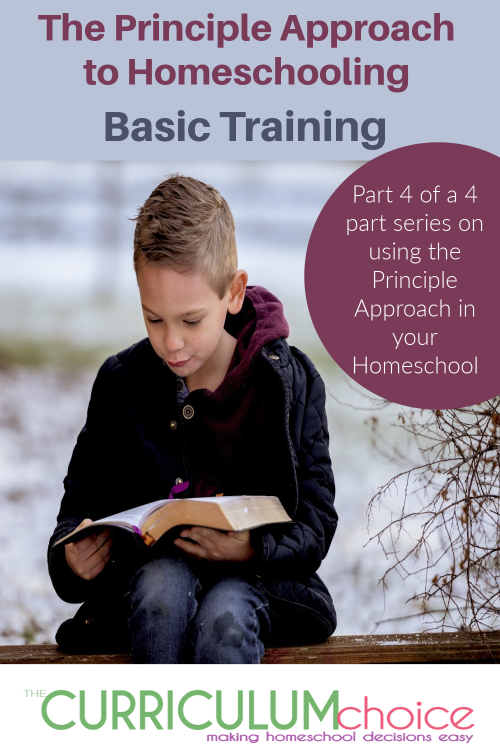This is the fourth of a four part series to answer why, how, and what in regards to the Principle Approach® to homeschooling.

I’d love to offer my thoughts while I am still on summer break and you can take them for what they’re worth. I think one of the things that new people try to do is wrap their mind around the whole thing, but that’s what leads to becoming overwhelmed.
The Principle Approach® to Homeschooling – Basic Training
The Principle Approach® is a simple process of researching/reading, reasoning, relating, and recording. It’s not a workbook approach or even a test driven approach. If you, together with your children, do the 4 R’s in any subject, you’ll be a Principle Approach teacher.
Start with One Subject
Take the subject of history (your one subject) and chose one topic, like the Pilgrims, in preparation for Thanksgiving. Then use the 4 R’s to learn about that subject.
Read
Buy the $5 book The Landing of the Pilgrims (great Landmark book that is historically accurate and contains implicit Biblical principles).
Read aloud a chapter while all your children are sitting comfortably where ever with a snack or drink or anything to settle them.
As you read for about 20 minutes and they listen, make sure to have them monitor their comprehension and explain any words/phrases they don’t understand (keep track of words they don’t know so you can use that for vocabulary lesson later).
Reason
Along the way, have them stop you when they hear something about the character of the people, or a description of the setting, or a major event. Tell them in advance that they need to stop you when they hear setting, character, or plot and discuss those things with them.
If possible have a separate piece of paper nearby to document those things in the author’s words. You or an older child can write it down along the way. When you’re done make your way to the table for a 15-30 min session of reasoning and writing. Have younger students copy your notes (only as much as they can handle-one sentence or so) and draw pictures to go along with that, either for setting, character, or plot.
Record
Then, look up and define, on a page entitled “Vocabulary,” a word that they didn’t understand. Have the older students write down (younger do it orally) a sentence using that word. As a further reasoning assignment for the same day or another, have them look up words in a Bible concordance that you encountered in your reading that describes a character or idea, like “care” or “freedom,” and write down 1-3 verses that explain more about what the Bible says about that topic and possible write down a principle or truth from what was learned in that word study.
Relate
Also, after reading a certain number of chapters, try to have them deduce various themes, like brotherly love, endurance, wisdom, conscience was sacred, friendship individuality, free enterprise, etc. Have them write the theme in a sentence on a separate paper entitled “Theme.”
More Learning
More ways to enrich a study about the Pilgrims:
- go to the library and find books about colonial life
- cook, play games, make things, or dress in that period
- draw/color maps or their home in Holland or Cape Code,
- make a Massachusetts flag, etc.
When you are all finished with this study you have a notebook or assignments the children did together with you and a memory of fun ways that you enriched their understanding of the Pilgrims. You could do this with any study: Columbus, G. Washington, Abe Lincoln, or any event centered around their time.
Models of the Principle Approach® Education
If you want more help in the one subject you’re using the Principle Approach to homeschooling with, or want to see it modeled, these are all wonderful models of PA thinking. Learn from them and then try to do it on your own.
I had full training in the Principle Approach and I still take this exact process. Year after year you learn more and more. Each year you’ll be surprised what you’ve learned (not how much you know). Half of what you learn is alongside your kids in their school time.
When Planning a New Subject, Start with a List of Questions
Lastly, when we were getting ready to start teaching the American Revolution with my kids I knew nothing. I first started formulating questions in my mind of things I wanted to know:
- When did it start?
- How did it end?
- How and why did Washington get to lead?
- Why did it start?
- Why did the colonists want to become independent?
- How did they unify themselves?
- What the big deal about the Boston tea party?
- How do all the details fit into God’s plan? etc.
Pre-thinking is important before studying anything. It prepares your mind and when you do research, your questions will begin to be answered and these are things that you’re going to want your children to focus on in their learning because it’s what you learned. Teach them to ask questions of things they might want to know about. Teach them to write down what they learn.
The Principle Approach® to Homeschool Education – The Series

This series explores Using the Principle Approach® in your Homeschool. The Principle Approach® provides the structure of truth that frames true education. Wisdom is the key and the Principle Approach® method forms wisdom as children learn how to think and reason from a Biblical perspective in order to redirect their humanness towards God.
- Part I: The Principle Approach® is a Philosophy
- Part II: The Principle Approach® is a Method
- Part III: The Principle Approach® is a Curriculum
- Part IV: The Principle Approach® Basic Training {THIS POST}
What Do Homeschool Methods Look Like in Real Life? – The Series

Be sure to check out our entire series on Homeschool Methods. In it we cover 8 different methods, what they are, and how to implement them in your homeschool.
~ This guest post by Raquel Werk was originally published in September 2009. Raquel is the wife of an attorney, a home school mom of two upper elementary children, and founder of Kahuahana Christian School (started this school year) in Maui, Hawaii. She has a master’s degree in Christian curriculum design from Regent University, written a unit of Bible curriculum for Chrysalis International, and been homeschooling and training teachers in Principle Approach® education for 6 years.
– “The Noah Plan® and/or The Principle Approach® are registered trademarks of the Foundation for American Christian Education.”


Two thumbs up. Great job of taking the scare out of it.
Fantastic! I am printing this off to guide me this year in our integrated history/geography/literature studies! ( :
Thanks so much,
Mandi